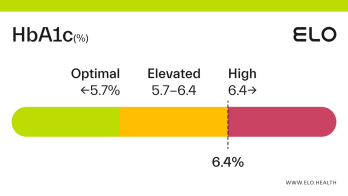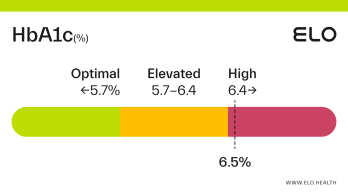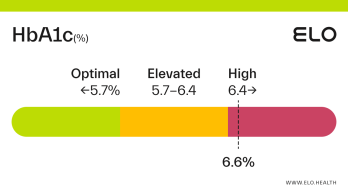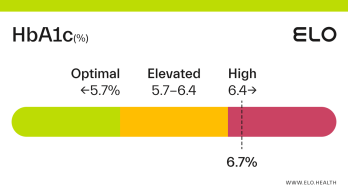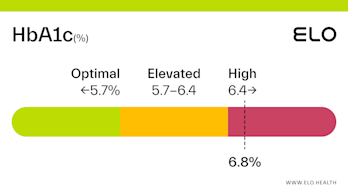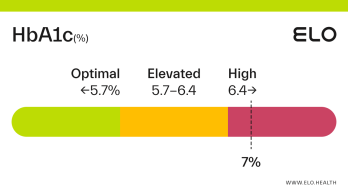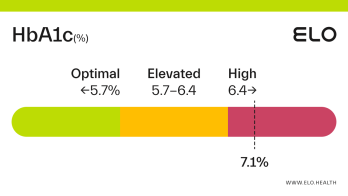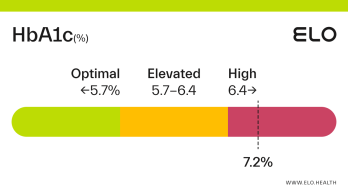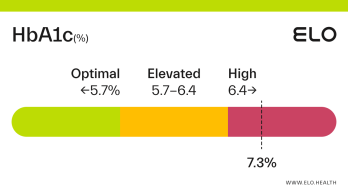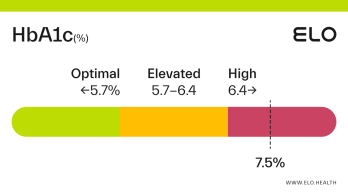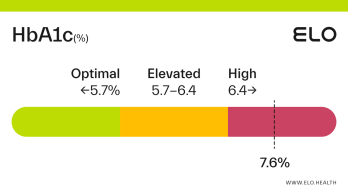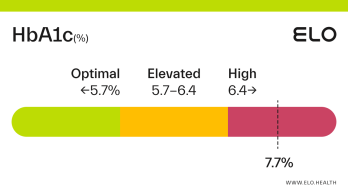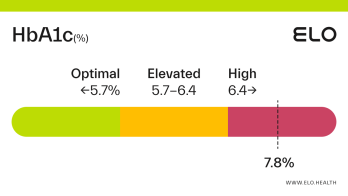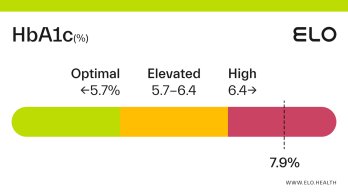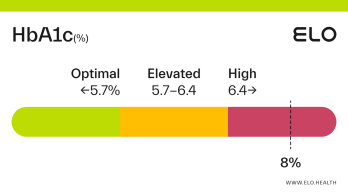HbA1c: 7.4
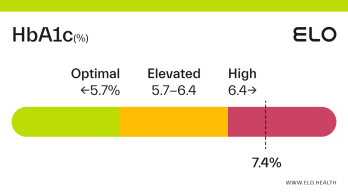
What does an A1c level of 7.4 mean? Are there any symptoms associated with this A1c level?
An A1c level of 7.4 percent is considered high and means that 7.4% of the hemoglobin in your blood is saturated with sugar. A1c levels of 6.5 or greater are considered diabetes.
If your A1c is high, a combination of diet and lifestyle changes and medications can help you lower your levels. The lower your A1c the less risk you have for developing some of the more serious complications of diabetes including cardiovascular disease, nerve and kidney damage, and vision loss.
An A1c of 7.4 may or may not have noticeable symptoms. Common symptoms of diabetes include increased thirst, frequent urination, increased hunger, unintentional weight loss, fatigue, and/or blurred vision.
Factors that could contribute to an A1c level of 7.4:
A variety of factors can lead to high A1c levels. Some of these include:
Diets that are high in refined carbohydrates and added sugar, and low in fiber
Being overweight or obese
A sedentary lifestyle
Age (A1c tends to increase gradually as you get older)
Race (people of Black, Hispanic/Latino, American Indian, Asian American, or Pacific Islander descent are at greater risk for prediabetes/ diabetes.)
Stress
Use of certain medications, including glucocorticoids
Family history of pre-diabetes or diabetes
Adherence to your prediabetes/ diabetes management plan
Pregnancy
Chronic disease/ inflammation
Several things can also falsely increase or decrease your A1c result. Some of these include:
Severe anemia
Liver disease or kidney failure
Certain medicines, including opioids and some HIV medications
Blood loss or blood transfusions
Early or late pregnancy
A less common type of hemoglobin found in people of African, Mediterranean, or Southeast Asian descent, as well as people with blood disorders like sickle cell anemia or thalassemia
Let your doctor know if any of these apply to you to determine if you need additional testing.
What to do if your A1c level is 7.4?
If your A1c is high, a combination of diet and lifestyle changes, and medications can help you lower your levels. The goal for most adults with diabetes is an A1c below 7%, but the lower the better.
Making changes to your diet and adopting healthier habits can help lower your levels. Here are some things you can do to lower your A1c:
Be active every day. AIm to get 30-60 minutes of exercise 5 days per week.
At every meal, fill half of your plate with non-starchy veggies, and incorporate a source of lean protein and plant-based fat to assist with blood sugar control.
Limit refined carbohydrates and added sugar; choose whole-grain carbs like whole wheat bread and pasta, quinoa, farro, and steel-cut oats, instead.
Lose weight if you are overweight or obese.
Manage stress and get adequate sleep to help balance hormone levels that can impact blood sugar.
Follow your diabetes treatment plan if you have been diagnosed with diabetes.
Medications used to improve A1c results
Medications, along with healthy diet and lifestyle changes, can help to lower elevated A1c levels into a safer range. If necessary, your doctor and/or dietitian will work with you to determine which ones are right for you. Some common diabetes medications include:
Insulin: Typically given by injection or through a pump to increase glucose (sugar) uptake by cells and thus decrease blood sugar
Sulfonylureas: Increase insulin production by stimulating insulin-producing beta cells in the pancreas
Alpha-glucosidase inhibitors: Help your body break down starches and sugars found in food, lowering your blood sugar levels.
Biguanides: Reduce the amount of sugar your liver produces, as well as how much sugar your intestines absorb and makes your body more sensitive to insulin. The most common biguanide is metformin.
Dopamine agonist: These medications work by affecting the way the brain processes dopamine, an important neurotransmitter (chemical messenger). By increasing the activity of dopamine receptors, dopamine agonists increase insulin sensitivity, allowing cells to use blood glucose more effectively and lower blood sugar.
DPP-4 inhibitors: Help the body continue to make insulin, which lowers blood sugar
GLP-1 receptor agonists: Increase growth of insulin-producing beta-cells in the pancreas, slow stomach emptying, and decrease appetite and how much glucagon (which raises blood sugar) your body uses
Meglitinides: Similar to sulfonylureas (but by a different mechanism) meglitinides stimulate the pancreas to release insulin in response to a meal. This increase in insulin production helps lower blood sugar.
SGLT 2 inhibitors: Prevent the kidneys from holding on to glucose and increasing its excretion in urine
Thiazolidinediones: Decrease glucose in your liver and also help your fat cells better utilize insulin
References
All About Your A1C. (2018, August 21). Centers for Disease Control and Prevention.
https://www.cdc.gov/diabetes/managing/managing-blood-sugar/a1c.html
Diabetes Risk - What Causes Diabetes. (n.d.). American Diabetes Association. Retrieved September 14, 2021, from
https://www.diabetes.org/diabetes-risk
Cherney, K. (2020, June 18). A Complete List of Diabetes Medications. Healthline.
https://www.healthline.com/health/diabetes/medications-list
Pani, L. N., Korenda, L., Meigs, J. B., Driver, C., Chamany, S., Fox, C. S., Sullivan, L., D'Agostino, R. B., & Nathan, D. M. (2008). Effect of aging on A1C levels in individuals without diabetes: evidence from the Framingham Offspring Study and the National Health and Nutrition Examination Survey 2001-2004. Diabetes care, 31(10), 1991–1996.
https://doi.org/10.2337/dc08-0577

